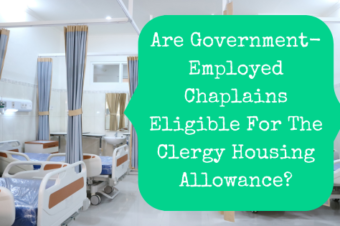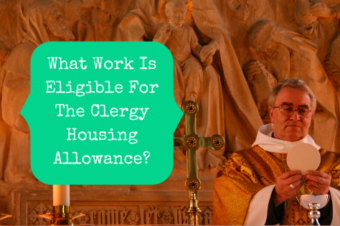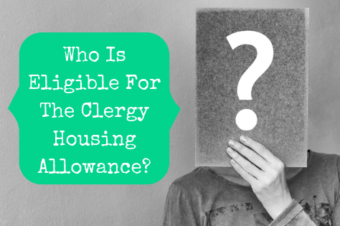
This is a guest post by Ben Wacek, Certified Financial Planner® and founder of Guide Financial Planning, where he offers clients Bible-based financial guidance both in-person in Minnesota and virtually throughout the country.
I am a financial planner and many of my clients are pastors. It’s interesting because I didn’t set out to work with pastors. However, my belief that faith should impact how we manage our finances and the fact that I don’t have any minimum investment requirements seem to have drawn pastors to me. I’m glad, though, because I’ve really enjoyed working with them.
They have taught me a lot, too. In this blog post, I’d like to share five things I’ve learned about pastors from working with them over the last five years.
1. You Aren’t That Unique
Most of the questions pastors ask are the same questions that everyone else asks. You want to know:
- How much should I be saving?
- Where should I invest my money?
- Do I have enough saved to be able to retire?
Those are the top three questions for most Americans and the primary reason they seek out the services of a financial planner. So, while pastors do have some unique financial planning decisions to make, most of the questions they ask are similar to my other clients.
2. You Aren’t Maxing Out Your Housing Allowance
I have found that many pastors do not fully utilize the ministerial housing allowance. Most are indeed taking a housing allowance, they just aren’t taking full advantage of the opportunity. Why is that? If things are tight, why are you essentially leaving money on the table by not taking full advantage of the housing allowance?
First of all, most pastors do not know what expenses are qualified or simply aren’t tracking them all. There are a lot of small expenses beyond mortgage, rent, and utilities that count towards your housing allowance and can really add up. Taking the time to track them really does pay off come tax time.
Another reason that pastors aren’t receiving the full benefit of the housing allowance is that their church isn’t designating a high enough amount of their salary as a housing allowance. The church has to pre-designate the housing allowance and you are limited to that amount, no matter how high your true expenses are.
Because of this, it is always safer to overestimate your expenses when requesting your housing allowance. If your designated housing allowance turns out to be higher than your expenses it is a quick and easy fix. But if it is lower, there is no way to change it retroactively.
Finally, many retired pastors are not utilizing the opportunity to take qualified withdrawals from a 403(b) in retirement. As long as you use money from a church-sponsored retirement plan, you can continue to take a housing allowance even after you stop working.
3. You Don’t Track Your Expenses
While my engineering clients often track and plan for every penny they spend in an excel spreadsheet, pastors are generally not wired the same way. My pastor clients often have no idea how much they are spending on a monthly basis or where their money is going. While there is some value in not obsessing about the intricate details of your cash flow, there are also some really good reasons to have a better handle on your spending.
When you track your spending, you can be more intentional and tell your money where to go. You can align your spending with your values and avoid wasting money on things that don’t really matter to you.
In Matthew 6:21, Jesus says that money can serve as a window into your heart. If you have never tracked your expenses, you’ve never given yourself the opportunity to look through this window to evaluate the state of your heart.
Tracking your expenses is a wise move, both practically and spiritually.
4. You Don’t Save For The Distant Future
I have found that most pastors are saving very little, if anything, into a long-term “retirement” account. And, while I don’t think our society’s view of retirement is Biblical, I still believe it’s very important for pastors to save for the future. The most common reasons pastors give for not saving for retirement are:
- I don’t make enough.
- I’ll do it later.
- God will take care of me in my later years.
While I can understand some basis for each of these reasons, it is crucial to save for the future. I recommend setting a goal to save at least 10% of income into a retirement account – especially early on when you can reap the greatest benefit from compounding interest.
5. You Are Very Generous
To put it simply, I’m blown away by the percentage of their income that most of my pastor clients give to Kingdom purposes. These pastors are truly living out what they preach. And I’m one of the lucky few who get to have an insider’s view of such generosity.
I read this Q&A several years ago with John Piper on the topic of pastor’s pay and it has stuck with me. Piper describes the real risks of a pastor increasing their lifestyle too much. When I see pastors giving so generously, it’s encouraging. I’m encouraged not only because of the good it does for those they give to but also because of the evidence of the Holy Spirit working in their hearts.
I hope that after reading this blog post you’re encouraged that you’re likely not alone in some of the triumphs and struggles you face when managing your personal finances. And I also hope you are challenged to potentially make some adjustments to the way you manage your finances to become more intentional with the way you steward the financial resources God has entrusted to you.
I’m grateful for the work you are doing to make more disciples of Christ on this earth – thank you!




1 Response
Chris
January 30, 2019Great stuff!